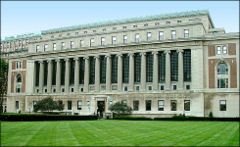Butler Library
Butler Library is the main library for undergraduates, named for Nicholas Murray Butler. It holds 2 million volumes in the humanities. Butler has study rooms open 24 hours a day during the school year. Students in Butler tend to either work or spend time on Boredatbutler.com.
Contents
History
Butler was begun in 1929 and dedicated in 1934 in response to a space crunch at Low Library, which after 30 years had become too small to hold Columbia's growing collection. Columbia had James Gamble Rogers execute a design for a new library to be built on the 114th street border of the campus. The building was originally named South Hall, before being named in honor of Butler. It is said that there was a move to name the library after Columbia's 10th president, Frederick A. P. Barnard, but Butler put the kibosh on the idea, leaving the building strategically unnamed until his own retirement.
Milstein Library
Butler is also home to the Phillip L. Milstein Family College Library which is the official designation for the 24-hour reading rooms and the collection of books stored within on the 2nd, 3rd, and 4th floors of the library. Since Milstein isn't really distinguishable from Butler itself in any major fashion, no one actually uses the term 'Milstein', and most probably don't even know that it 'exists'. After 11pm, when the other rooms of the library close, graduate students come down from other floors and overcrowd the 24-hour reading rooms.
Facilities
- Lockers: enter the lottery every year at http://www.columbia.edu/cu/lweb/indiv/butler/lockers/.
- Photocopiers: on every floor.
Floor 2 (exit level)
- Blue Java Butler coffee bar.
- 214: the lounge, the only place you can eat and talk.
- 213: CUIT computer lab.
- 209-212: Milstein undergraduate reading rooms.
Butler culture
- Inspired the site Boredatbutler.com.
- Students supposedly make out and go so far as to have sex in the stacks. No one has ever seen this actually happen.
- People tend to stick to their own preferred reading rooms, and entire social networks develop around these after a time, particularly on the fourth floor.

